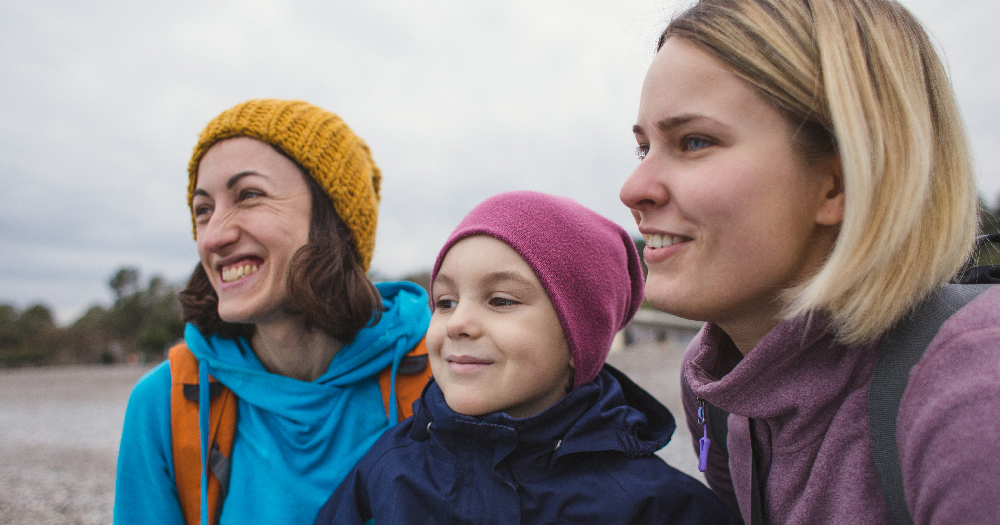Bulgaria should issue identity papers for a child with two mothers in a same-sex marriage, the European Court of Justice’s advocate general said in an opinion on Thursday which could have ramifications for thousands of rainbow families in the EU.
The opinion by the advocate general, which is not legally binding, relates to a case of a married lesbian Bulgarian-British couple and their child. The 16 month-old baby girl was born in Spain and was given a Spanish birth cert with the two women listed as the parents, but she could not receive Spanish citizenship as neither of the parents are Spanish.
The couple tried to get a Bulgarian birth cert in order to get a Bulgarian, and EU, identity document for the child. Bulgarian authorities wanted to know who the biological mother was before they would issue a birth cert. The parents declined to give that information, arguing that Bulgarian law does not require them to do so.
Bulgaria, which does not recognise same-sex marriage, then refused, saying that according to national law, the baby’s birth certificate cannot include two people of the same sex and should only list her biological mother. This decision was appealed and Bulgaria turned to the EU’s top court in Luxembourg to determine whether the country was breaking EU law by not registering the birth of the baby.
The baby also is ineligible for British nationality because her British mother was born in Gibraltar, a British territory, and obtained her British nationality through descent, which prevents her from passing on her British nationality. This has led to the child being effectively stateless.
The European Court of Justice’s advocate general, Juliane Kokott, recommended that “a balance be struck between the national identity of the member states and the right to freedom of movement of the child and of his or her parents.”
Kokott said that even if Bulgaria may justify its refusal to recognise the parentage of the child by its national law, it still “must issue her with an identity document or a travel document… in order to allow the child to travel with each of her parents individually.”
A birth certificate is a prerequisite for the issuing of any identity document in Bulgaria so Kokott added that “a refusal to issue it would therefore undermine the effective exercise of the child’s right to freedom of movement.”
One of the cornerstones of the EU is freedom of movement for its citizens. However, in reality this is not the case for many LGBTQ+ citizens. It is based on the assumption that the EU citizen is heterosexual. If a ‘traditional family’ moves to another member state, the parents’ marriage certificate and the children’s birth certificates will be recognised. The parents will enjoy all the rights and duties of married couples. Their children will have two legal parents. The family will be able to focus on finding employment or self-employment, and a place to live.
In many cases for LGBTQ+ people moving to certain member states, the couple ceases to be legally a couple, becoming instead two unrelated individuals, and their child or children go from having two legal parents to only one legal parent or (in a few cases involving surrogacy) no legal parents. For example, nine member states, including Ireland, might not recognise a same-sex registered partner in some situations.
Leading LGBTQ+ rights organisations in Europe are very encouraged by the court’s opinion. “The opinion is pointing in the right direction, as it clarifies that parentage established in one member state must be recognised for reasons of freedom of movement across the EU, and all EU citizens and their families equally enjoy freedom of movement,” according to Katrin Hugendubel, Advocacy Director of ILGA-Europe. “As already confirmed in Romanian Coman case, arguments on ‘national identity’, namely that Bulgaria does not recognise rainbow families, cannot justify a violation of EU law.”
Eleni Maravelia, President of NELFA, the Network of LGBTIQ* Families Associations, says: “NELFA is very pleased with the opinion of the AG, who is giving a clear answer to Bulgaria and all EU member states that EU law has to be respected at all times when dealing with cross-border issues, even when it comes to rainbow families with children who might not be covered by the national legislation. We are hoping the final decision by the court will take under consideration the AG opinion and build on it so to include the protection of the rights of the child.”
A final ruling by the EU court is expected later this year, and while it does not have to, it usually does follow the preliminary opinions. In the meantime, the girl will not be able to leave Spain.
© 2021 GCN (Gay Community News). All rights reserved.
Support GCN
GCN is a free, vital resource for Ireland’s LGBTQ+ community since 1988.
GCN is a trading name of National LGBT Federation CLG, a registered charity - Charity Number: 20034580.
GCN relies on the generous support of the community and allies to sustain the crucial work that we do. Producing GCN is costly, and, in an industry which has been hugely impacted by rising costs, we need your support to help sustain and grow this vital resource.
Supporting GCN for as little as €1.99 per month will help us continue our work as Ireland’s free, independent LGBTQ+ media.
